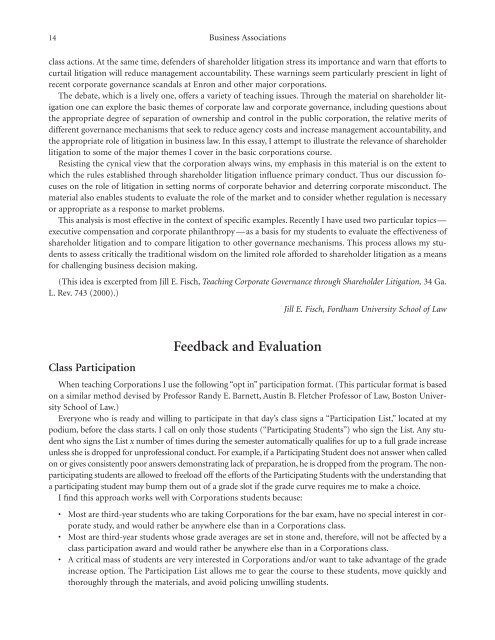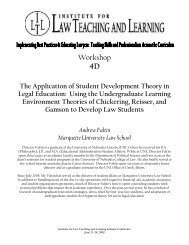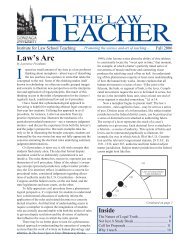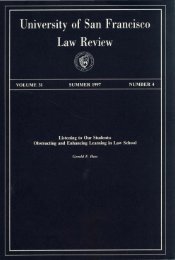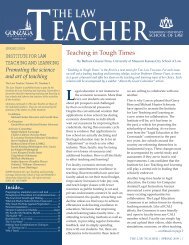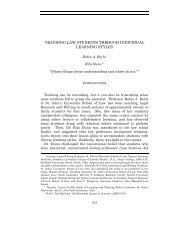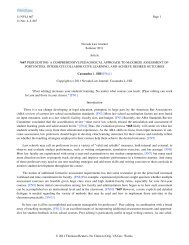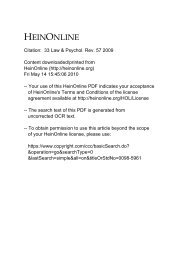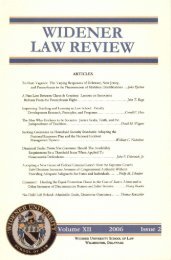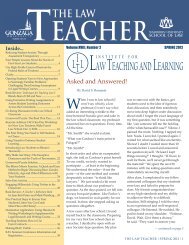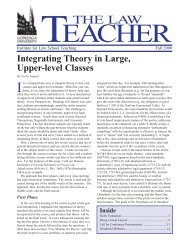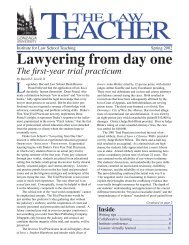Teaching the Law School Curriculum - Institute for Law Teaching ...
Teaching the Law School Curriculum - Institute for Law Teaching ...
Teaching the Law School Curriculum - Institute for Law Teaching ...
You also want an ePaper? Increase the reach of your titles
YUMPU automatically turns print PDFs into web optimized ePapers that Google loves.
14 Business Associations<br />
class actions. At <strong>the</strong> same time, defenders of shareholder litigation stress its importance and warn that ef<strong>for</strong>ts to<br />
curtail litigation will reduce management accountability. These warnings seem particularly prescient in light of<br />
recent corporate governance scandals at Enron and o<strong>the</strong>r major corporations.<br />
The debate, which is a lively one, offers a variety of teaching issues. Through <strong>the</strong> material on shareholder litigation<br />
one can explore <strong>the</strong> basic <strong>the</strong>mes of corporate law and corporate governance, including questions about<br />
<strong>the</strong> appropriate degree of separation of ownership and control in <strong>the</strong> public corporation, <strong>the</strong> relative merits of<br />
different governance mechanisms that seek to reduce agency costs and increase management accountability, and<br />
<strong>the</strong> appropriate role of litigation in business law. In this essay, I attempt to illustrate <strong>the</strong> relevance of shareholder<br />
litigation to some of <strong>the</strong> major <strong>the</strong>mes I cover in <strong>the</strong> basic corporations course.<br />
Resisting <strong>the</strong> cynical view that <strong>the</strong> corporation always wins, my emphasis in this material is on <strong>the</strong> extent to<br />
which <strong>the</strong> rules established through shareholder litigation influence primary conduct. Thus our discussion focuses<br />
on <strong>the</strong> role of litigation in setting norms of corporate behavior and deterring corporate misconduct. The<br />
material also enables students to evaluate <strong>the</strong> role of <strong>the</strong> market and to consider whe<strong>the</strong>r regulation is necessary<br />
or appropriate as a response to market problems.<br />
This analysis is most effective in <strong>the</strong> context of specific examples. Recently I have used two particular topics —<br />
executive compensation and corporate philanthropy — as a basis <strong>for</strong> my students to evaluate <strong>the</strong> effectiveness of<br />
shareholder litigation and to compare litigation to o<strong>the</strong>r governance mechanisms. This process allows my students<br />
to assess critically <strong>the</strong> traditional wisdom on <strong>the</strong> limited role af<strong>for</strong>ded to shareholder litigation as a means<br />
<strong>for</strong> challenging business decision making.<br />
(This idea is excerpted from Jill E. Fisch, <strong>Teaching</strong> Corporate Governance through Shareholder Litigation, 34 Ga.<br />
L. Rev. 743 (2000).)<br />
Class Participation<br />
Feedback and Evaluation<br />
Jill E. Fisch, Fordham University <strong>School</strong> of <strong>Law</strong><br />
When teaching Corporations I use <strong>the</strong> following “opt in” participation <strong>for</strong>mat. (This particular <strong>for</strong>mat is based<br />
on a similar method devised by Professor Randy E. Barnett, Austin B. Fletcher Professor of <strong>Law</strong>, Boston University<br />
<strong>School</strong> of <strong>Law</strong>.)<br />
Everyone who is ready and willing to participate in that day’s class signs a “Participation List,” located at my<br />
podium, be<strong>for</strong>e <strong>the</strong> class starts. I call on only those students (“Participating Students”) who sign <strong>the</strong> List. Any student<br />
who signs <strong>the</strong> List x number of times during <strong>the</strong> semester automatically qualifies <strong>for</strong> up to a full grade increase<br />
unless she is dropped <strong>for</strong> unprofessional conduct. For example, if a Participating Student does not answer when called<br />
on or gives consistently poor answers demonstrating lack of preparation, he is dropped from <strong>the</strong> program. The nonparticipating<br />
students are allowed to freeload off <strong>the</strong> ef<strong>for</strong>ts of <strong>the</strong> Participating Students with <strong>the</strong> understanding that<br />
a participating student may bump <strong>the</strong>m out of a grade slot if <strong>the</strong> grade curve requires me to make a choice.<br />
I find this approach works well with Corporations students because:<br />
• Most are third-year students who are taking Corporations <strong>for</strong> <strong>the</strong> bar exam, have no special interest in corporate<br />
study, and would ra<strong>the</strong>r be anywhere else than in a Corporations class.<br />
• Most are third-year students whose grade averages are set in stone and, <strong>the</strong>re<strong>for</strong>e, will not be affected by a<br />
class participation award and would ra<strong>the</strong>r be anywhere else than in a Corporations class.<br />
• A critical mass of students are very interested in Corporations and/or want to take advantage of <strong>the</strong> grade<br />
increase option. The Participation List allows me to gear <strong>the</strong> course to <strong>the</strong>se students, move quickly and<br />
thoroughly through <strong>the</strong> materials, and avoid policing unwilling students.


